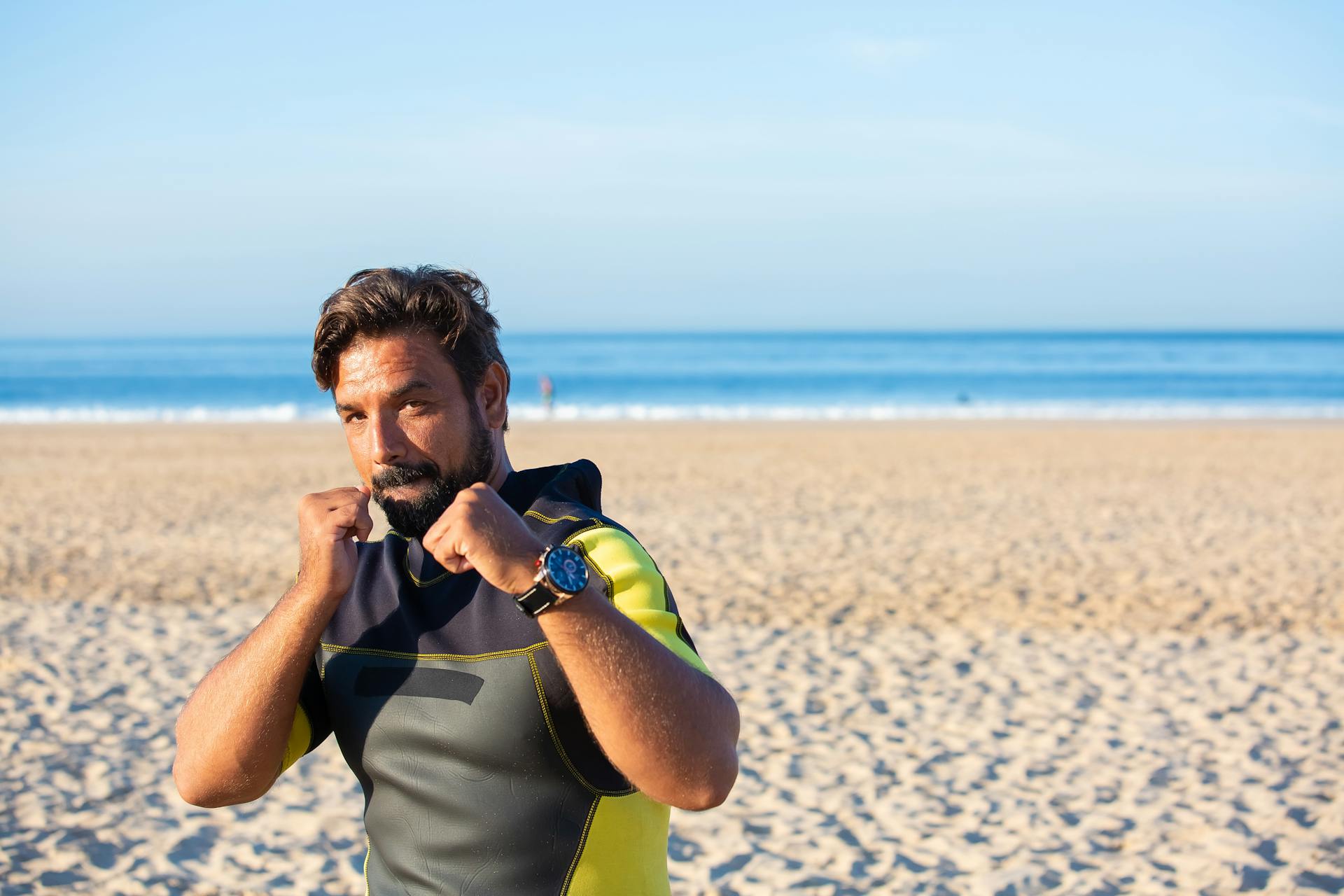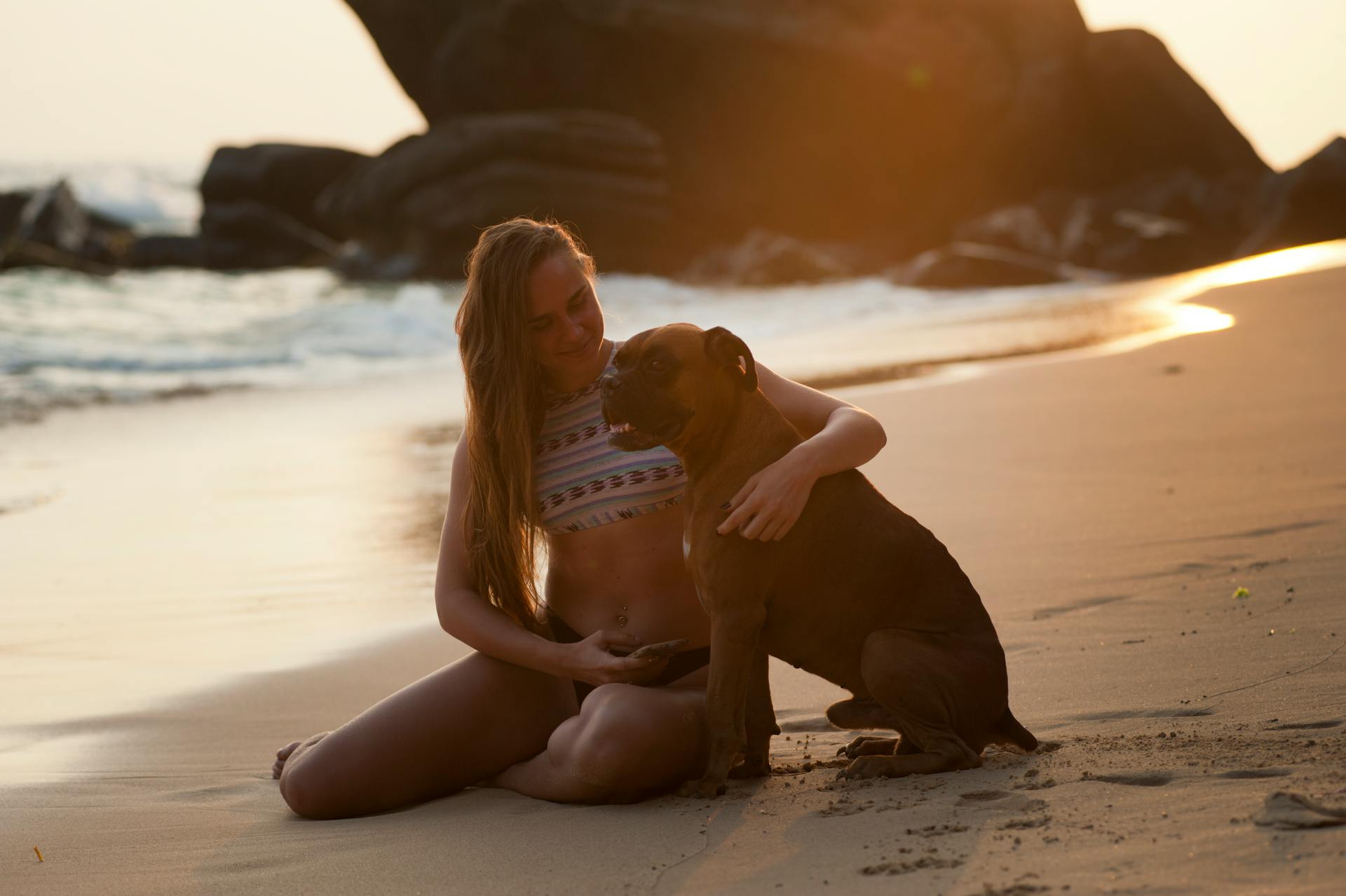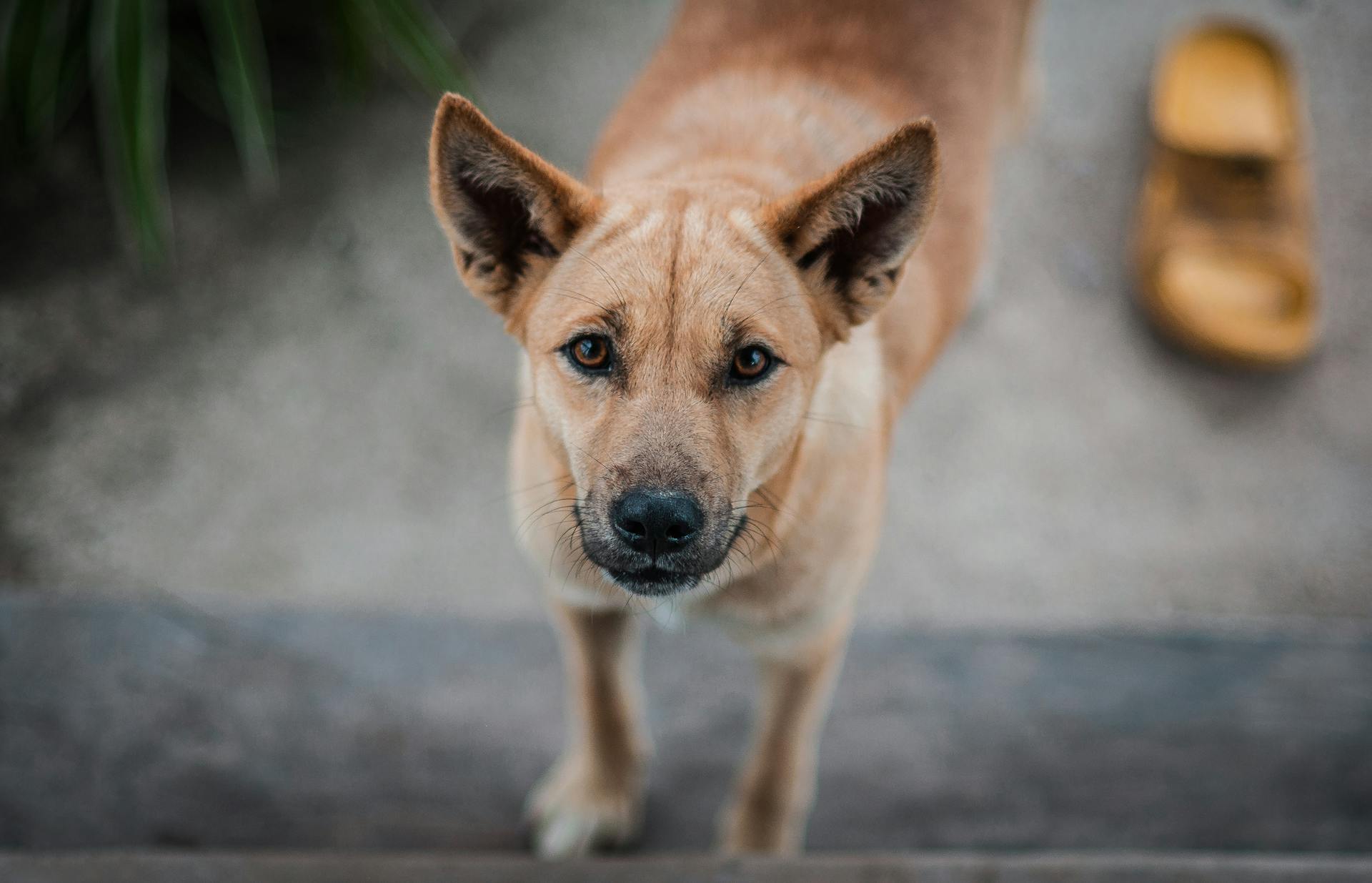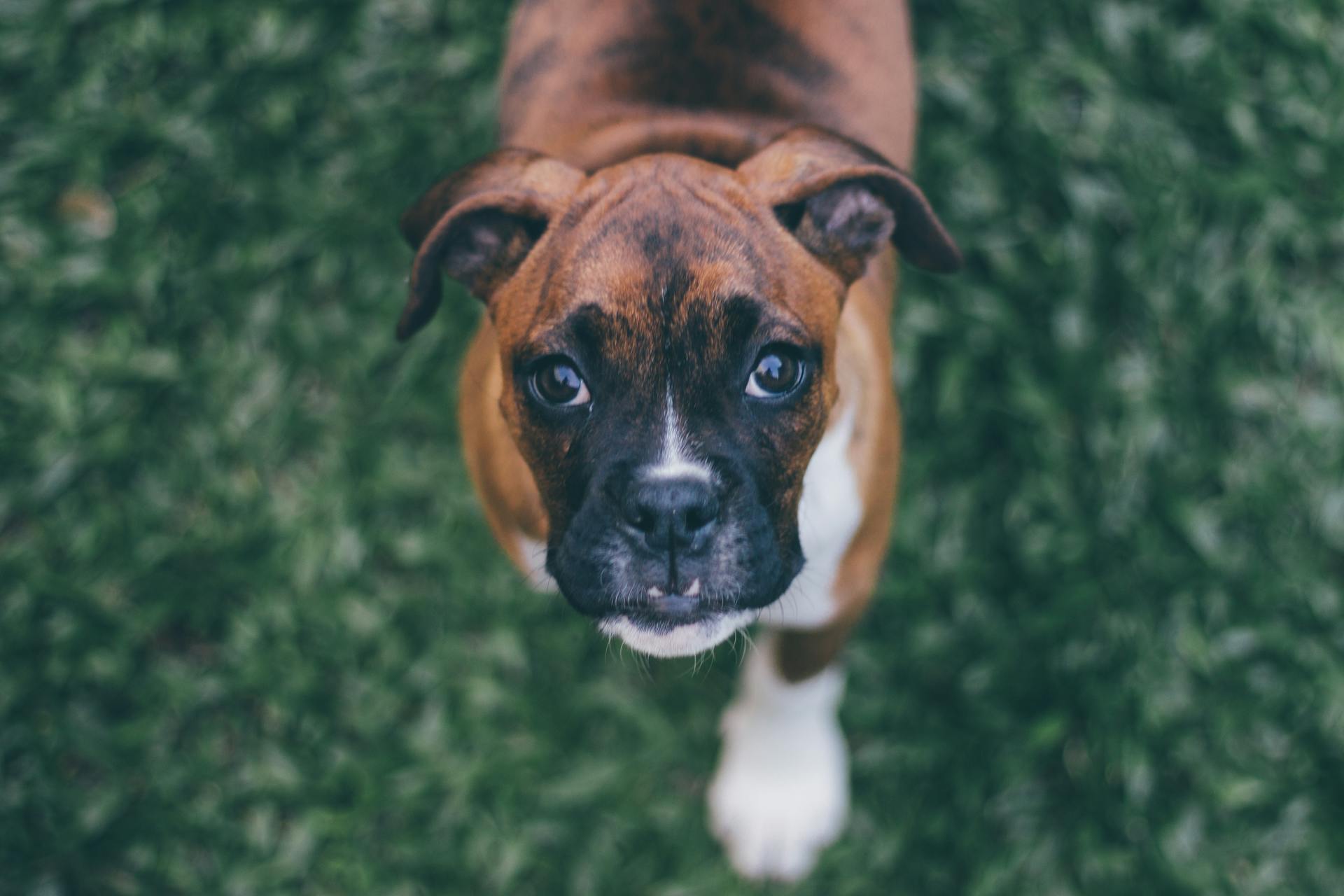
Boxer Bulls are a unique and energetic breed, requiring special care and attention. They need regular exercise to stay happy and healthy, with at least 30 minutes of physical activity per day.
Their short coats require minimal grooming, but regular nail trimming and ear cleaning are essential. A Boxer Bull's diet should consist of high-quality dog food, divided into 2-3 meals a day.
Boxer Bulls are prone to health issues such as heart problems and allergies, so regular veterinary check-ups are a must. With proper care and attention, they can live up to 10-12 years.
Getting Started
If you're considering getting a Bull Boxer, you'll want to make sure you're prepared for their high energy level.
Bull Boxer puppies are very active and energetic, so you'll need to have the energy to keep up with them.
To give your Bull Boxer the exercise they need, aim for 30-60 minutes of exercise per day.
This can be a combination of playtime, walks, and training sessions.
It's also a good idea to brush their short, smooth coat weekly to keep them looking their best.
With their high level of intelligence, Bull Boxers are very easy to train with positive reinforcement.
Here are some key things to consider when getting started with your Bull Boxer:
- Exercise needs: 30-60 minutes of exercise per day
- Training: Easy to train with positive reinforcement
- Grooming: Weekly brushing
Remember, Bull Boxers can be wary of strangers and other dogs, so it's a good idea to socialize them well from an early age.
Physical Characteristics
Boxer Bull dogs typically stand between 21 and 25 inches tall at the shoulder.
Males usually weigh around 70 pounds, while females tip the scales at about 60 pounds.
Their broad, flat head and wide muzzle make them a distinctive-looking breed.
Size
Boxers are a medium-sized breed, and their size can vary slightly depending on whether they're male or female. Males typically stand between 22.5 to 25 inches tall at the shoulder.
Their weight is also a key indicator of their size, with males usually weighing around 70 pounds. This can vary, but it's a good general guideline to keep in mind.
Females, on the other hand, are slightly smaller, standing between 21 to 23.5 inches tall.
Check this out: Caucasian Shepherd Size
Breed Appearance
The Bullboxer Pit breed has a unique appearance that's a combination of its parent breeds. They have a broad, flat head and a wide muzzle that's either short or medium in length.
Their brown eyes are small to medium in size and can be round or slightly almond shaped. Their ears sit up high on the head and can either fold over to the front or to the sides.
Some owners may choose to crop their ears, which will cause them to stand upright. Their long, tapered tail curves at the end and may be docked by some owners.
They have a single layer glossy coat that lays flat against the body and comes in almost every color, except for merle. Black or white markings often stand out against their base colors.
Their dental care is particularly important due to the possibility of an undershot bite, as seen in some Boxers.
Related reading: Pit Bulls Ears
Bull Temperament
Bull Boxers are intelligent and friendly dogs, but they don't like to be left alone for long periods of time. They require a firm hand when it comes to training.
Bull Boxers are excellent for families, especially active ones, as they love spending time with kids. However, they do need supervision around very small children.
Bullboxer Pits are also excellent family dogs and love spending time with children, but young kids should be supervised while around these dogs. They're very protective of their family, but also very friendly and loving.
Bull Boxers can be protective of their owners, making them excellent guard dogs, but they can also be very friendly and loving if trained and treated well. They're not suited for apartment living as they need space to move, run, and play.
Discover more: Friendly Pit Bulls
Health and Maintenance
The Bullboxer Pit is a unique breed that requires some special attention when it comes to its health and maintenance.
This hybrid is prone to cardiomyopathy, hip dysplasia, and bloat, so regular check-ups with your veterinarian are crucial to catch any potential issues early on.
Bullboxer Pits can also be susceptible to demodectic mange, allergies, and obesity, which can be managed with proper care and attention to diet.
To keep your Bullboxer Pit's heart healthy, your vet may recommend heart checks, X-rays, and physical examinations.
Regular skin scrapings can help diagnose skin issues like demodectic mange, and allergy tests can pinpoint any allergies your dog may have.
In terms of grooming, Bullboxer Pits have a short coat that's easy to manage, but they do shed heavily, so regular brushing with a curry comb or soft bristle brush is essential.
A weekly face wipe-down can help prevent the formation of red yeast and other fungal or bacterial infestations, especially if your dog has inherited the facial folds and wrinkles of the Boxer.
To keep your Bullboxer Pit's paw pads healthy, use a good dog-safe moisturizer and start early to get your dog accustomed to having their feet touched.
Here's a quick rundown of the health issues and maintenance tasks to keep an eye on:
- Health issues: cardiomyopathy, hip dysplasia, bloat, demodectic mange, allergies, obesity
- Maintenance tasks: regular brushing, monthly baths, skin scrapings, allergy tests, heart checks, X-rays, physical examinations, face wipe-downs, paw pad moisturizing
Owning a Boxer Bull
Owning a Boxer Bull requires time, money, and patience. This mixed breed needs to be trained, socialized, and kept healthy and happy.
You'll need to spend time with your Boxer Bull puppy to teach them socialization skills, so they get along with other pets. This is crucial, as they have a high prey drive and might react to small animals running.
The Boxer Bull is an intelligent and friendly breed that wants to please their owner, but they do require a firm hand when it comes to training. With proper training and socialization, they'll make a loyal and loving companion for life.
Broaden your view: Training Boxer Puppies
Owner Experiences
If you're considering bringing a Bull Boxer into your family, you'll want to know how they interact with other pets. As long as they're taught socialization skills as a puppy, you should have no problems with them getting along with other pets.
However, it's essential to remember that Bull Boxers have a high prey drive and often react to small animals running, with the instinct to run after them. This means you'll need to socialize and train your Bull Boxer when they're puppies and keep up with that same training and socialization throughout their lives.
Consider reading: Can Pit Bulls Make Good Pets
Socialization is key when it comes to Bull Boxers, and it's crucial that proper training and socialization occur at a young age and will need to be monitored throughout the dog's life. This will help them develop good habits and reduce the likelihood of problems with other pets.
If you have an active life, plenty of time and determination to train them, and a lot of love and patience, the Bull Boxer will make you a loyal, loving companion for life. They're an excellent combination of a dog that is friendly and courageous, fit and fearless while still being courageous and cuddly.
Owning a Bull
Owning a Bull Boxer requires time, money, and patience to train, socialize, and keep them healthy and happy.
The Bull Boxer is an intelligent and friendly breed that doesn't like to be left alone for long periods of time.
They are intelligent enough to want to please their owner, but they do require a firm hand when it comes to training.
As long as they're taught socialization skills as a puppy, Bull Boxers should get along with other pets.
However, they have a high prey drive and may react to small animals running, so consistent training and socialization are crucial.
Bull Boxers are physically powerful dogs, but also very devoted and protective, making them excellent working dogs.
They're a great combination of friendly and courageous, fit and fearless, while still being cuddly.
If you have an active life, plenty of time, and determination to train them, the Bull Boxer will make a loyal and loving companion for life.
They're not right for someone who has never had a dog before, but with the right care and attention, they'll thrive.
Frequently Asked Questions
What is the lifespan of a Bull Boxer dog?
A Bull Boxer's lifespan typically ranges from 10 to 14 years, allowing for a long and loving companionship with their family.
Featured Images: pexels.com


